虚拟语气倒装阅读完型翻译答案
- 格式:doc
- 大小:33.50 KB
- 文档页数:7
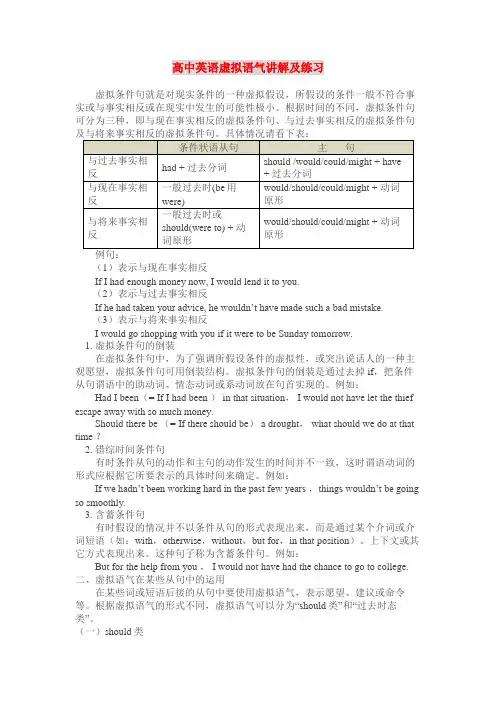
高中英语虚拟语气讲解及练习虚拟条件句就是对现实条件的一种虚拟假设,所假设的条件一般不符合事实或与事实相反或在现实中发生的可能性极小。
根据时间的不同,虚拟条件句可分为三种,即与现在事实相反的虚拟条件句、与过去事实相反的虚拟条件句(1)表示与现在事实相反If I had enough money now, I would lend it to you.(2)表示与过去事实相反If he had taken your advice, he wouldn’t have made such a bad mistake.(3)表示与将来事实相反I would go shopping with you if it were to be Sunday tomorrow.1. 虚拟条件句的倒装在虚拟条件句中,为了强调所假设条件的虚拟性,或突出说话人的一种主观愿望,虚拟条件句可用倒装结构。
虚拟条件句的倒装是通过去掉if,把条件从句谓语中的助动词、情态动词或系动词放在句首实现的。
例如:Had I been(= If I had been ) in that situation, I would not have let the thief escape away with so much money.Should there be (= If there should be) a drought, what should we do at that time ?2. 错综时间条件句有时条件从句的动作和主句的动作发生的时间并不一致,这时谓语动词的形式应根据它所要表示的具体时间来确定。
例如:If we hadn’t been working hard in the past few years ,thing s wouldn’t be going so smoothly.3. 含蓄条件句有时假设的情况并不以条件从句的形式表现出来,而是通过某个介词或介词短语(如:with,otherwise,without,but for,in that position)、上下文或其它方式表现出来。
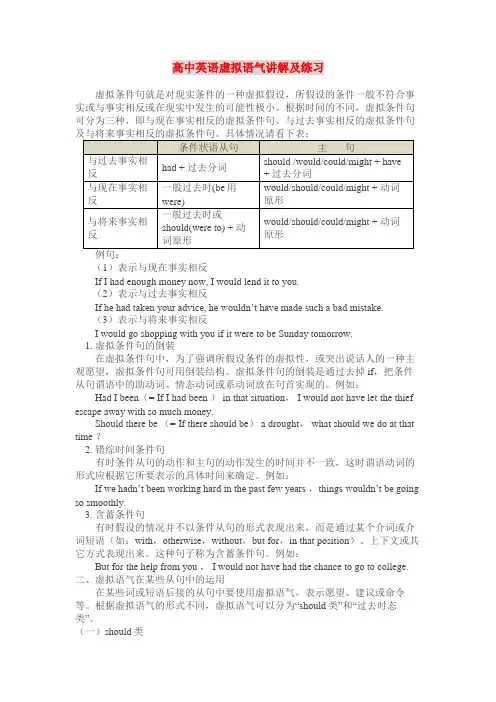
高中英语虚拟语气讲解及练习虚拟条件句就是对现实条件的一种虚拟假设,所假设的条件一般不符合事实或与事实相反或在现实中发生的可能性极小。
根据时间的不同,虚拟条件句可分为三种,即与现在事实相反的虚拟条件句、与过去事实相反的虚拟条件句(1)表示与现在事实相反If I had enough money now, I would lend it to you.(2)表示与过去事实相反If he had taken your advice, he wouldn’t have made such a bad mistake.(3)表示与将来事实相反I would go shopping with you if it were to be Sunday tomorrow.1. 虚拟条件句的倒装在虚拟条件句中,为了强调所假设条件的虚拟性,或突出说话人的一种主观愿望,虚拟条件句可用倒装结构。
虚拟条件句的倒装是通过去掉if,把条件从句谓语中的助动词、情态动词或系动词放在句首实现的。
例如:Had I been(= If I had been ) in that situation, I would not have let the thief escape away with so much money.Should there be (= If there should be) a drought, what should we do at that time ?2. 错综时间条件句有时条件从句的动作和主句的动作发生的时间并不一致,这时谓语动词的形式应根据它所要表示的具体时间来确定。
例如:If we hadn’t been working hard in the past few years ,thing s wouldn’t be going so smoothly.3. 含蓄条件句有时假设的情况并不以条件从句的形式表现出来,而是通过某个介词或介词短语(如:with,otherwise,without,but for,in that position)、上下文或其它方式表现出来。
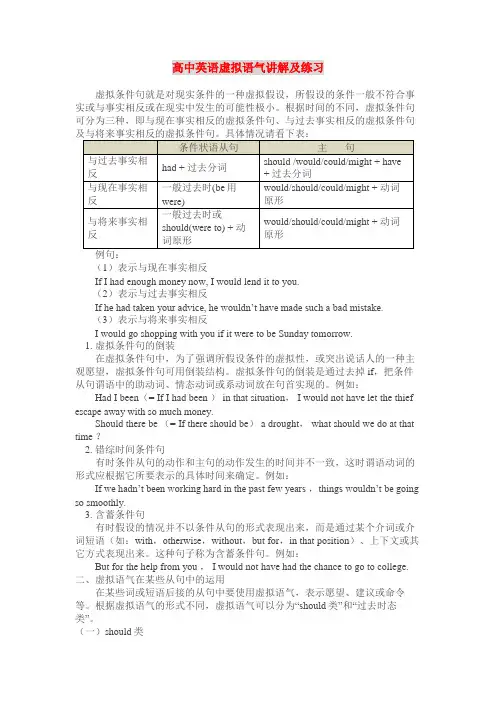
高中英语虚拟语气讲解及练习虚拟条件句就是对现实条件的一种虚拟假设,所假设的条件一般不符合事实或与事实相反或在现实中发生的可能性极小。
根据时间的不同,虚拟条件句可分为三种,即与现在事实相反的虚拟条件句、与过去事实相反的虚拟条件句(1)表示与现在事实相反If I had enough money now, I would lend it to you.(2)表示与过去事实相反If he had taken your advice, he wouldn’t have made such a bad mistake.(3)表示与将来事实相反I would go shopping with you if it were to be Sunday tomorrow.1. 虚拟条件句的倒装在虚拟条件句中,为了强调所假设条件的虚拟性,或突出说话人的一种主观愿望,虚拟条件句可用倒装结构。
虚拟条件句的倒装是通过去掉if,把条件从句谓语中的助动词、情态动词或系动词放在句首实现的。
例如:Had I been(= If I had been ) in that situation, I would not have let the thief escape away with so much money.Should there be (= If there should be) a drought, what should we do at that time ?2. 错综时间条件句有时条件从句的动作和主句的动作发生的时间并不一致,这时谓语动词的形式应根据它所要表示的具体时间来确定。
例如:If we hadn’t been working hard in the past few years ,thing s wouldn’t be going so smoothly.3. 含蓄条件句有时假设的情况并不以条件从句的形式表现出来,而是通过某个介词或介词短语(如:with,otherwise,without,but for,in that position)、上下文或其它方式表现出来。
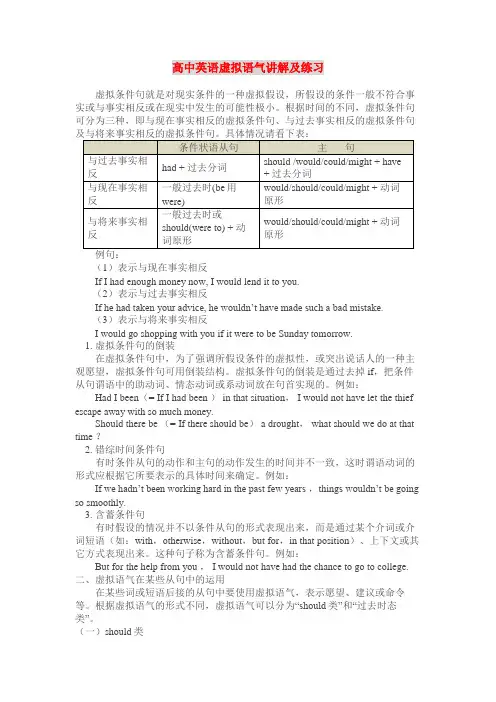
高中英语虚拟语气讲解及练习 虚拟条件句就是对现实条件的一种虚拟假设,所假设的条件一般不符合事实或与事实相反或在现实中发生的可能性极小。根据时间的不同,虚拟条件句可分为三种,即与现在事实相反的虚拟条件句、与过去事实相反的虚拟条件句及与将来事实相反的虚拟条件句。具体情况请看下表:
条件状语从句 主 句 与过去事实相反 had + 过去分词 should /would/could/might + have + 过去分词 与现在事实相反 一般过去时(be用were) would/should/could/might + 动词原形
与将来事实相反 一般过去时或should(were to) + 动词原形 would/should/could/might + 动词原形
例句: (1)表示与现在事实相反 If I had enough money now, I would lend it to you. (2)表示与过去事实相反 If he had taken your advice, he wouldn’t have made such a bad mistake. (3)表示与将来事实相反 I would go shopping with you if it were to be Sunday tomorrow. 1. 虚拟条件句的倒装 在虚拟条件句中,为了强调所假设条件的虚拟性,或突出说话人的一种主观愿望,虚拟条件句可用倒装结构。虚拟条件句的倒装是通过去掉if,把条件从句谓语中的助动词、情态动词或系动词放在句首实现的。例如: Had I been(= If I had been ) in that situation, I would not have let the thief escape away with so much money. Should there be (= If there should be) a drought, what should we do at that time ? 2. 错综时间条件句 有时条件从句的动作和主句的动作发生的时间并不一致,这时谓语动词的形式应根据它所要表示的具体时间来确定。例如: If we hadn’t been working hard in the past few years ,things wouldn’t be going so smoothly. 3. 含蓄条件句 有时假设的情况并不以条件从句的形式表现出来,而是通过某个介词或介词短语(如:with,otherwise,without,but for,in that position)、上下文或其它方式表现出来。这种句子称为含蓄条件句。例如: But for the help from you , I would not have had the chance to go to college. 二、虚拟语气在某些从句中的运用 在某些词或短语后接的从句中要使用虚拟语气,表示愿望、建议或命令等。根据虚拟语气的形式不同,虚拟语气可以分为“should类”和“过去时态类”。 (一)should类 这一类的虚拟语气是通过从句中的谓语动词使用“should +动词原形”体现出来的,should可以省略。其具体运用体现在: 1. 在suggest , order, demand , propose, command, request, desire,insist等表示建议、命令、要求、意见的动词后接的宾语从句中要使用虚拟语气。 如:He suggests that she should leave the house at once. The leader ordered that the task(should) be finished as soon as possible. He proposed that we (should)deal with the problem by the view of development. 2. 与suggest,order,demand,propose,command,request,desire,insist等动词相对应的名词suggestion,order,demand,proposal等后的表语从句或同位语从句中要使用虚拟语气。如:The general sent the order that the battle(should)be held on until the complete failure of the enemy. My proposal is that we(should) set a deadline for handing in the plan. 3. 在It is/was suggested (ordered,demanded,proposed,etc.)结构以及necessary,essential,important,strange,natural等形容词后的主语从句中要使用虚拟语气。如: It’s requested that we (should)keep the stability of the society for the people’s peaceful life. It is necessary that the badly wounded man(should) be treated immediately. (二)过去时态类 英语中,还有一些词或短语后接的从句或句子,也要使用虚拟语气,虚拟语气是通过句中的谓语使用过去的某种时态(如:一般过去时、过去完成时等)来体现的。 1. wish,would rather 后的宾语从句。如: He wished he had never been involved in such affairs. I would rather you could teach me again. 2. as if,as though引导的从句。如: The little boy knows so many things as if he was a man. He acted as usual as though nothing had happened. 3. 由if only (要是……,那该多好啊!)引导的惊叹句。如: If only I had passed the test! If only it stopped raining! 4. It is(about/high) time 后的定语从句。如: It is time we went out for a walk. It was high time they had begun to prepare the experiment. 三、虚拟语气的其它用法 在英语中,一些表示建议、请求、劝告、愿望、祈祷、祝福或诅咒的句子,也需要使用虚拟语气。如: Would you mind smoking here? May you be lucky! Long live the people of China! God save me. 虚拟语气练习题 1.—Why didn’t you call me then? —Oh, my cell-phone was power off. I ________ you otherwise. A.would call B.had called C.have called D.would have called 【答案】D 【解析】 【详解】 考查虚拟语气。句意:---为什么当时你不给我打电话?--哦,我的手机没电了。否则的话我会给你打的。此处相当于if条件状语从句中与过去事实相反的虚拟语气,主句用would /should /could/might +have+过去分词,指如果我手机当时有电的话我会给你打的。故选D. 【名师点睛】 含蓄虚拟条件句就是将条件从句隐藏在上下文一定的短语中的一类条件句,比如将条件隐含在不定式短语中,分词短语中,介词短语中,名词短语中,或某些连词(如or, or else, otherwise等)中,将条件隐含在定语从句中,将条件隐含在一定的上下文中,等等。如:
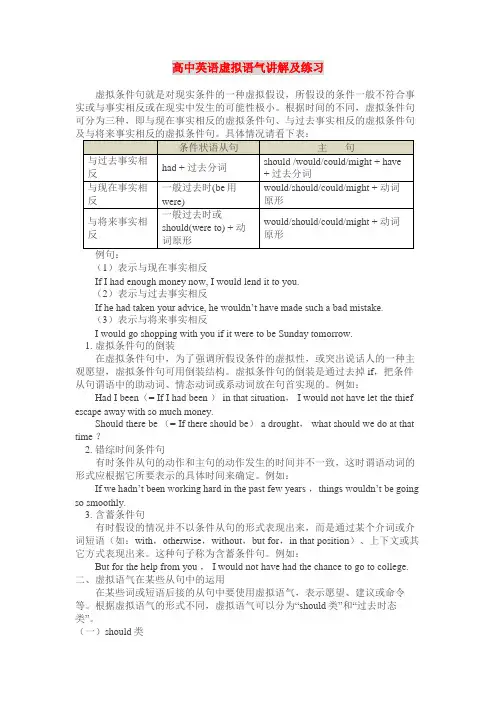
高中英语虚拟语气讲解及练习虚拟条件句就是对现实条件的一种虚拟假设,所假设的条件一般不符合事实或与事实相反或在现实中发生的可能性极小。
根据时间的不同,虚拟条件句可分为三种,即与现在事实相反的虚拟条件句、与过去事实相反的虚拟条件句(1)表示与现在事实相反If I had enough money now, I would lend it to you.(2)表示与过去事实相反If he had taken your advice, he wouldn’t have made such a bad mistake.(3)表示与将来事实相反I would go shopping with you if it were to be Sunday tomorrow.1. 虚拟条件句的倒装在虚拟条件句中,为了强调所假设条件的虚拟性,或突出说话人的一种主观愿望,虚拟条件句可用倒装结构。
虚拟条件句的倒装是通过去掉if,把条件从句谓语中的助动词、情态动词或系动词放在句首实现的。
例如:Had I been(= If I had been ) in that situation, I would not have let the thief escape away with so much money.Should there be (= If there should be) a drought, what should we do at that time ?2. 错综时间条件句有时条件从句的动作和主句的动作发生的时间并不一致,这时谓语动词的形式应根据它所要表示的具体时间来确定。
例如:If we hadn’t been working hard in the past few years ,thing s wouldn’t be going so smoothly.3. 含蓄条件句有时假设的情况并不以条件从句的形式表现出来,而是通过某个介词或介词短语(如:with,otherwise,without,but for,in that position)、上下文或其它方式表现出来。
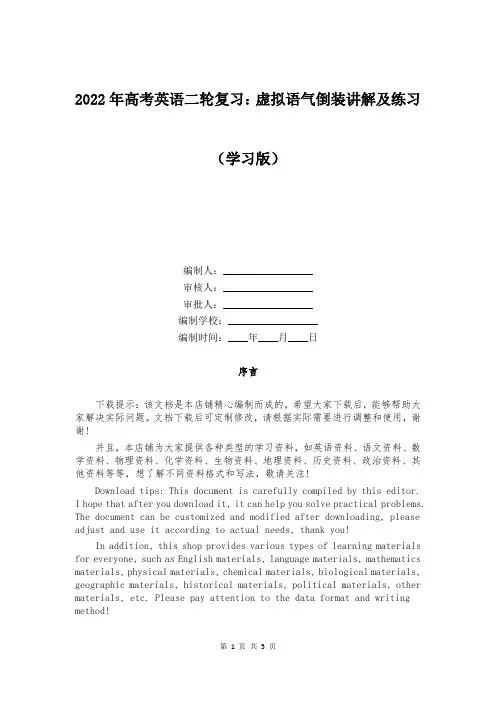
2022年高考英语二轮复习:虚拟语气倒装讲解及练习(学习版)编制人:__________________审核人:__________________审批人:__________________编制学校:__________________编制时间:____年____月____日序言下载提示:该文档是本店铺精心编制而成的,希望大家下载后,能够帮助大家解决实际问题。
文档下载后可定制修改,请根据实际需要进行调整和使用,谢谢!并且,本店铺为大家提供各种类型的学习资料,如英语资料、语文资料、数学资料、物理资料、化学资料、生物资料、地理资料、历史资料、政治资料、其他资料等等,想了解不同资料格式和写法,敬请关注!Download tips: This document is carefully compiled by this editor.I hope that after you download it, it can help you solve practical problems. The document can be customized and modified after downloading, please adjust and use it according to actual needs, thank you!In addition, this shop provides various types of learning materials for everyone, such as English materials, language materials, mathematics materials, physical materials, chemical materials, biological materials, geographic materials, historical materials, political materials, other materials, etc. Please pay attention to the data format and writing method!2022年高考英语二轮复习:虚拟语气倒装讲解及练习--> 部分倒装的形式: 主谓宾保持原来的形式,谓语动词的助动词放到主语的前面。
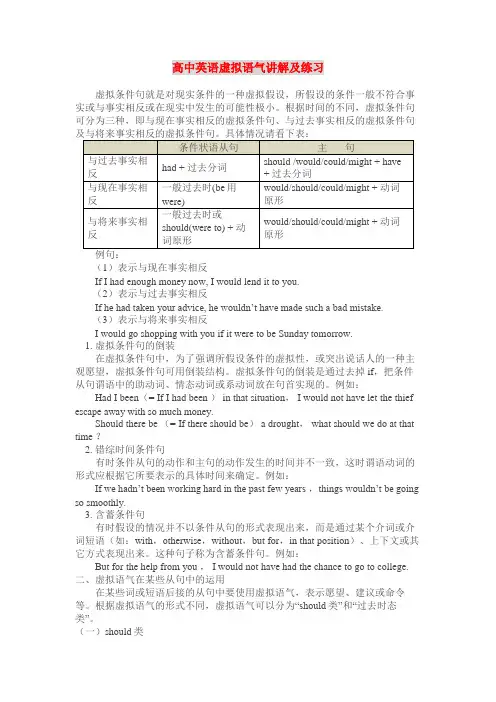
高中英语虚拟语气讲解及练习虚拟条件句就是对现实条件的一种虚拟假设,所假设的条件一般不符合事实或与事实相反或在现实中发生的可能性极小。
根据时间的不同,虚拟条件句可分为三种,即与现在事实相反的虚拟条件句、与过去事实相反的虚拟条件句(1)表示与现在事实相反If I had enough money now, I would lend it to you.(2)表示与过去事实相反If he had taken your advice, he wouldn’t have made such a bad mistake.(3)表示与将来事实相反I would go shopping with you if it were to be Sunday tomorrow.1. 虚拟条件句的倒装在虚拟条件句中,为了强调所假设条件的虚拟性,或突出说话人的一种主观愿望,虚拟条件句可用倒装结构。
虚拟条件句的倒装是通过去掉if,把条件从句谓语中的助动词、情态动词或系动词放在句首实现的。
例如:Had I been(= If I had been ) in that situation, I would not have let the thief escape away with so much money.Should there be (= If there should be) a drought, what should we do at that time ?2. 错综时间条件句有时条件从句的动作和主句的动作发生的时间并不一致,这时谓语动词的形式应根据它所要表示的具体时间来确定。
例如:If we hadn’t been working hard in the past few years ,thing s wouldn’t be going so smoothly.3. 含蓄条件句有时假设的情况并不以条件从句的形式表现出来,而是通过某个介词或介词短语(如:with,otherwise,without,but for,in that position)、上下文或其它方式表现出来。
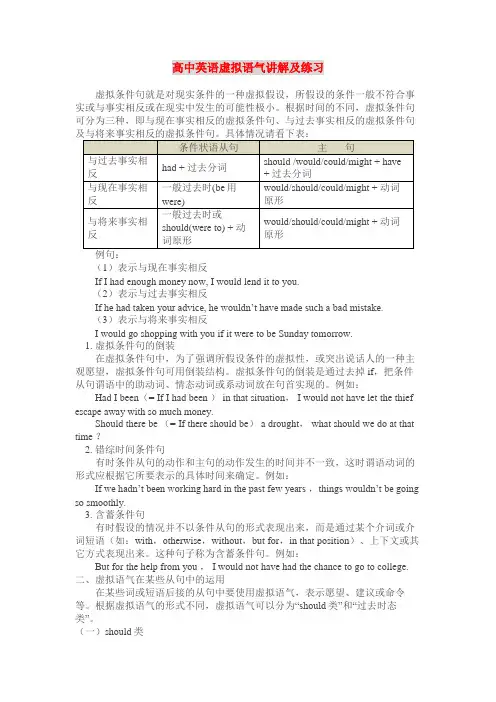
高中英语虚拟语气讲解及练习虚拟条件句就是对现实条件的一种虚拟假设,所假设的条件一般不符合事实或与事实相反或在现实中发生的可能性极小。
根据时间的不同,虚拟条件句可分为三种,即与现在事实相反的虚拟条件句、与过去事实相反的虚拟条件句(1)表示与现在事实相反If I had enough money now, I would lend it to you.(2)表示与过去事实相反If he had taken your advice, he wouldn’t have made such a bad mistake.(3)表示与将来事实相反I would go shopping with you if it were to be Sunday tomorrow.1. 虚拟条件句的倒装在虚拟条件句中,为了强调所假设条件的虚拟性,或突出说话人的一种主观愿望,虚拟条件句可用倒装结构。
虚拟条件句的倒装是通过去掉if,把条件从句谓语中的助动词、情态动词或系动词放在句首实现的。
例如:Had I been(= If I had been ) in that situation, I would not have let the thief escape away with so much money.Should there be (= If there should be) a drought, what should we do at that time ?2. 错综时间条件句有时条件从句的动作和主句的动作发生的时间并不一致,这时谓语动词的形式应根据它所要表示的具体时间来确定。
例如:If we hadn’t been working hard in the past few years ,thing s wouldn’t be going so smoothly.3. 含蓄条件句有时假设的情况并不以条件从句的形式表现出来,而是通过某个介词或介词短语(如:with,otherwise,without,but for,in that position)、上下文或其它方式表现出来。
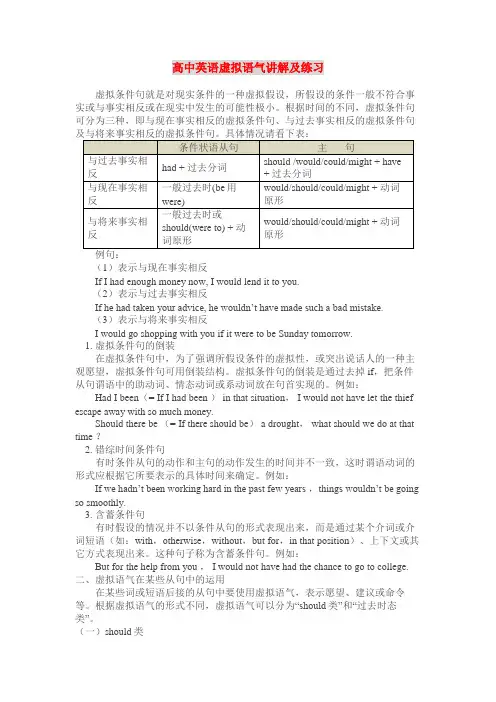
高中英语虚拟语气讲解及练习虚拟条件句就是对现实条件的一种虚拟假设,所假设的条件一般不符合事实或与事实相反或在现实中发生的可能性极小。
根据时间的不同,虚拟条件句可分为三种,即与现在事实相反的虚拟条件句、与过去事实相反的虚拟条件句(1)表示与现在事实相反If I had enough money now, I would lend it to you.(2)表示与过去事实相反If he had taken your advice, he wouldn’t have made such a bad mistake.(3)表示与将来事实相反I would go shopping with you if it were to be Sunday tomorrow.1. 虚拟条件句的倒装在虚拟条件句中,为了强调所假设条件的虚拟性,或突出说话人的一种主观愿望,虚拟条件句可用倒装结构。
虚拟条件句的倒装是通过去掉if,把条件从句谓语中的助动词、情态动词或系动词放在句首实现的。
例如:Had I been(= If I had been ) in that situation, I would not have let the thief escape away with so much money.Should there be (= If there should be) a drought, what should we do at that time ?2. 错综时间条件句有时条件从句的动作和主句的动作发生的时间并不一致,这时谓语动词的形式应根据它所要表示的具体时间来确定。
例如:If we hadn’t been working hard in the past few years ,thing s wouldn’t be going so smoothly.3. 含蓄条件句有时假设的情况并不以条件从句的形式表现出来,而是通过某个介词或介词短语(如:with,otherwise,without,but for,in that position)、上下文或其它方式表现出来。
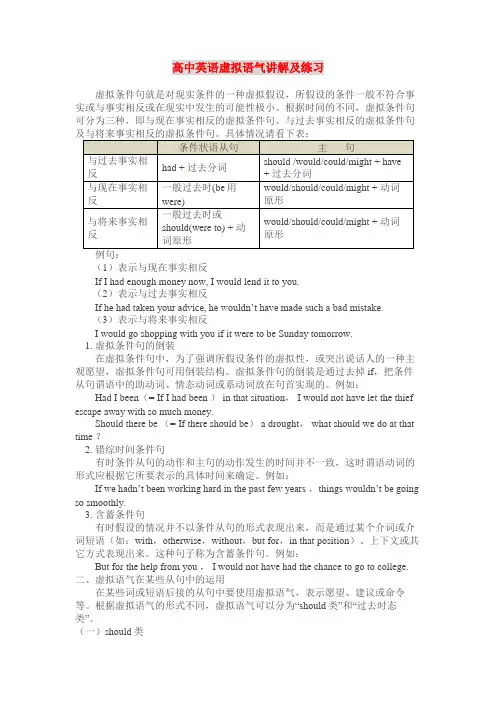
高中英语虚拟语气讲解及练习虚拟条件句就是对现实条件的一种虚拟假设,所假设的条件一般不符合事实或与事实相反或在现实中发生的可能性极小。
根据时间的不同,虚拟条件句可分为三种,即与现在事实相反的虚拟条件句、与过去事实相反的虚拟条件句(1)表示与现在事实相反If I had enough money now, I would lend it to you.(2)表示与过去事实相反If he had taken your advice, he wouldn’t have made such a bad mistake.(3)表示与将来事实相反I would go shopping with you if it were to be Sunday tomorrow.1. 虚拟条件句的倒装在虚拟条件句中,为了强调所假设条件的虚拟性,或突出说话人的一种主观愿望,虚拟条件句可用倒装结构。
虚拟条件句的倒装是通过去掉if,把条件从句谓语中的助动词、情态动词或系动词放在句首实现的。
例如:Had I been(= If I had been ) in that situation, I would not have let the thief escape away with so much money.Should there be (= If there should be) a drought, what should we do at that time ?2. 错综时间条件句有时条件从句的动作和主句的动作发生的时间并不一致,这时谓语动词的形式应根据它所要表示的具体时间来确定。
例如:If we hadn’t been working hard in the past few years ,thing s wouldn’t be going so smoothly.3. 含蓄条件句有时假设的情况并不以条件从句的形式表现出来,而是通过某个介词或介词短语(如:with,otherwise,without,but for,in that position)、上下文或其它方式表现出来。
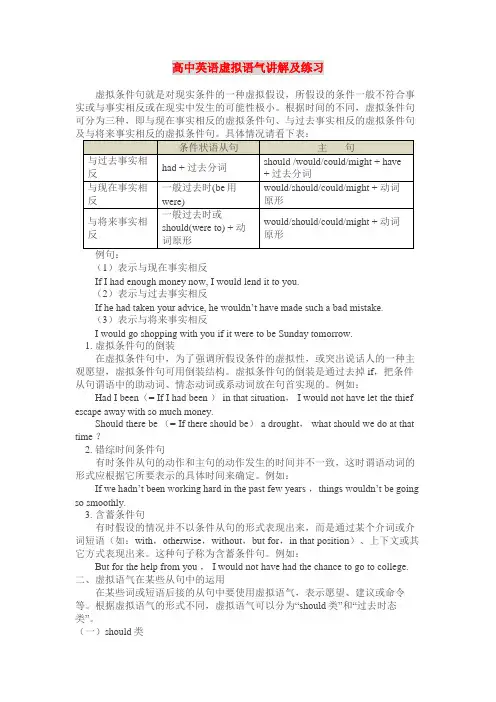
高中英语虚拟语气讲解及练习虚拟条件句就是对现实条件的一种虚拟假设,所假设的条件一般不符合事实或与事实相反或在现实中发生的可能性极小。
根据时间的不同,虚拟条件句可分为三种,即与现在事实相反的虚拟条件句、与过去事实相反的虚拟条件句(1)表示与现在事实相反If I had enough money now, I would lend it to you.(2)表示与过去事实相反If he had taken your advice, he wouldn’t have made such a bad mistake.(3)表示与将来事实相反I would go shopping with you if it were to be Sunday tomorrow.1. 虚拟条件句的倒装在虚拟条件句中,为了强调所假设条件的虚拟性,或突出说话人的一种主观愿望,虚拟条件句可用倒装结构。
虚拟条件句的倒装是通过去掉if,把条件从句谓语中的助动词、情态动词或系动词放在句首实现的。
例如:Had I been(= If I had been ) in that situation, I would not have let the thief escape away with so much money.Should there be (= If there should be) a drought, what should we do at that time ?2. 错综时间条件句有时条件从句的动作和主句的动作发生的时间并不一致,这时谓语动词的形式应根据它所要表示的具体时间来确定。
例如:If we hadn’t been working hard in the past few years ,thing s wouldn’t be going so smoothly.3. 含蓄条件句有时假设的情况并不以条件从句的形式表现出来,而是通过某个介词或介词短语(如:with,otherwise,without,but for,in that position)、上下文或其它方式表现出来。
高中英语虚拟语气讲解及练习虚拟条件句就是对现实条件的一种虚拟假设,所假设的条件一般不符合事实或与事实相反或在现实中发生的可能性极小。
根据时间的不同,虚拟条件句可分为三种,即与现在事实相反的虚拟条件句、与过去事实相反的虚拟条件句(1)表示与现在事实相反If I had enough money now, I would lend it to you.(2)表示与过去事实相反If he had taken your advice, he wouldn’t have made such a bad mistake.(3)表示与将来事实相反I would go shopping with you if it were to be Sunday tomorrow.1. 虚拟条件句的倒装在虚拟条件句中,为了强调所假设条件的虚拟性,或突出说话人的一种主观愿望,虚拟条件句可用倒装结构。
虚拟条件句的倒装是通过去掉if,把条件从句谓语中的助动词、情态动词或系动词放在句首实现的。
例如:Had I been(= If I had been ) in that situation, I would not have let the thief escape away with so much money.Should there be (= If there should be) a drought, what should we do at that time ?2. 错综时间条件句有时条件从句的动作和主句的动作发生的时间并不一致,这时谓语动词的形式应根据它所要表示的具体时间来确定。
例如:If we hadn’t been working hard in the past few years ,thing s wouldn’t be going so smoothly.3. 含蓄条件句有时假设的情况并不以条件从句的形式表现出来,而是通过某个介词或介词短语(如:with,otherwise,without,but for,in that position)、上下文或其它方式表现出来。
倒装句倒装的两种考法:1. 放在单项选择题中,考查考生的倒装语法知识是否熟练掌握;2. 放在完形填空和阅读理解中,设置理解障碍。
倒装的两种形式:1. 完全倒装:将整个谓语动词提到主语前。
2. 部分倒装:即半倒装,将谓语的一部分即助动词提到主语前。
一、完全倒装【翻译句子】(1)车来了。
Here comes the bus.(2)铃响了。
There goes the bell.(3)孩子们冲出来了。
Out rushed the children.(4)那个男孩离开了。
Away went the boy.【结论1】表方位的副词here, there 或out, in, up, down, away, off等标志词放在句首,句子用完全倒装。
【疑难】Here it is.In she came.Away he went.【疑难剖析】当主语是人称代词时,主谓语序不变。
【完成例句】(5)河的南面有一家小工厂。
In south of the river lies a small factory.(6)山谷里传来一声喊叫。
From the valley came a cry.【结论2】地点状语放在句首且谓语动词为come, live, lie, go等时用完全倒装。
【翻译句子】(7)Such are the facts. 情况就是如此。
(8)生活就是这样。
Such is life.(9)The following is the answer to the question. 这个问题的答案如下。
【结论3】such, the following等放句首时,句子要完全倒装。
【翻译句子】(10)山顶上有一幢高楼。
There is a tall building on the top of the mountain.(11)山顶上耸立着一座古塔。
There stands an ancient tower on the top of the mountain.【结论4】There lie / exist / stand / live +主语+…是there be 句型的变式。
高中英语虚拟语气讲解及练习虚拟条件句就是对现实条件的一种虚拟假设,所假设的条件一般不符合事实或与事实相反或在现实中发生的可能性极小。
根据时间的不同,虚拟条件句可分为三种,即与现在事实相反的虚拟条件句、与过去事实相反的虚拟条件句(1)表示与现在事实相反If I had enough money now, I would lend it to you.(2)表示与过去事实相反If he had taken your advice, he wouldn’t have made such a bad mistake.(3)表示与将来事实相反I would go shopping with you if it were to be Sunday tomorrow.1. 虚拟条件句的倒装在虚拟条件句中,为了强调所假设条件的虚拟性,或突出说话人的一种主观愿望,虚拟条件句可用倒装结构。
虚拟条件句的倒装是通过去掉if,把条件从句谓语中的助动词、情态动词或系动词放在句首实现的。
例如:Had I been(= If I had been ) in that situation, I would not have let the thief escape away with so much money.Should there be (= If there should be) a drought, what should we do at that time ?2. 错综时间条件句有时条件从句的动作和主句的动作发生的时间并不一致,这时谓语动词的形式应根据它所要表示的具体时间来确定。
例如:If we hadn’t been working hard in the past few years ,thing s wouldn’t be going so smoothly.3. 含蓄条件句有时假设的情况并不以条件从句的形式表现出来,而是通过某个介词或介词短语(如:with,otherwise,without,but for,in that position)、上下文或其它方式表现出来。
高中英语虚拟语气讲解及练习虚拟条件句就是对现实条件的一种虚拟假设,所假设的条件一般不符合事实或与事实相反或在现实中发生的可能性极小。
根据时间的不同,虚拟条件句可分为三种,即与现在事实相反的虚拟条件句、与过去事实相反的虚拟条件句(1)表示与现在事实相反If I had enough money now, I would lend it to you.(2)表示与过去事实相反If he had taken your advice, he wouldn’t have made such a bad mistake.(3)表示与将来事实相反I would go shopping with you if it were to be Sunday tomorrow.1. 虚拟条件句的倒装在虚拟条件句中,为了强调所假设条件的虚拟性,或突出说话人的一种主观愿望,虚拟条件句可用倒装结构。
虚拟条件句的倒装是通过去掉if,把条件从句谓语中的助动词、情态动词或系动词放在句首实现的。
例如:Had I been(= If I had been ) in that situation, I would not have let the thief escape away with so much money.Should there be (= If there should be) a drought, what should we do at that time ?2. 错综时间条件句有时条件从句的动作和主句的动作发生的时间并不一致,这时谓语动词的形式应根据它所要表示的具体时间来确定。
例如:If we hadn’t been working hard in the past few years ,thing s wouldn’t be going so smoothly.3. 含蓄条件句有时假设的情况并不以条件从句的形式表现出来,而是通过某个介词或介词短语(如:with,otherwise,without,but for,in that position)、上下文或其它方式表现出来。
高中英语虚拟语气讲解及练习虚拟条件句就是对现实条件的一种虚拟假设,所假设的条件一般不符合事实或与事实相反或在现实中发生的可能性极小。
根据时间的不同,虚拟条件句可分为三种,即与现在事实相反的虚拟条件句、与过去事实相反的虚拟条件句(1)表示与现在事实相反If I had enough money now, I would lend it to you.(2)表示与过去事实相反If he had taken your advice, he wouldn’t have made such a bad mistake.(3)表示与将来事实相反I would go shopping with you if it were to be Sunday tomorrow.1. 虚拟条件句的倒装在虚拟条件句中,为了强调所假设条件的虚拟性,或突出说话人的一种主观愿望,虚拟条件句可用倒装结构。
虚拟条件句的倒装是通过去掉if,把条件从句谓语中的助动词、情态动词或系动词放在句首实现的。
例如:Had I been(= If I had been ) in that situation, I would not have let the thief escape away with so much money.Should there be (= If there should be) a drought, what should we do at that time ?2. 错综时间条件句有时条件从句的动作和主句的动作发生的时间并不一致,这时谓语动词的形式应根据它所要表示的具体时间来确定。
例如:If we hadn’t been working hard in the past few years ,thing s wouldn’t be going so smoothly.3. 含蓄条件句有时假设的情况并不以条件从句的形式表现出来,而是通过某个介词或介词短语(如:with,otherwise,without,but for,in that position)、上下文或其它方式表现出来。
高中英语虚拟语气讲解及练习虚拟条件句就是对现实条件的一种虚拟假设,所假设的条件一般不符合事实或与事实相反或在现实中发生的可能性极小。
根据时间的不同,虚拟条件句可分为三种,即与现在事实相反的虚拟条件句、与过去事实相反的虚拟条件句(1)表示与现在事实相反If I had enough money now, I would lend it to you.(2)表示与过去事实相反If he had taken your advice, he wouldn’t have made such a bad mistake.(3)表示与将来事实相反I would go shopping with you if it were to be Sunday tomorrow.1. 虚拟条件句的倒装在虚拟条件句中,为了强调所假设条件的虚拟性,或突出说话人的一种主观愿望,虚拟条件句可用倒装结构。
虚拟条件句的倒装是通过去掉if,把条件从句谓语中的助动词、情态动词或系动词放在句首实现的。
例如:Had I been(= If I had been ) in that situation, I would not have let the thief escape away with so much money.Should there be (= If there should be) a drought, what should we do at that time ?2. 错综时间条件句有时条件从句的动作和主句的动作发生的时间并不一致,这时谓语动词的形式应根据它所要表示的具体时间来确定。
例如:If we hadn’t been working hard in the past few years ,thing s wouldn’t be going so smoothly.3. 含蓄条件句有时假设的情况并不以条件从句的形式表现出来,而是通过某个介词或介词短语(如:with,otherwise,without,but for,in that position)、上下文或其它方式表现出来。
路漫漫其修远兮,吾将上下而求索 - 百度文库 11 五.虚拟语气练习答案 1-10 DCBAB; CABBC 11-20 CCCAC; DADAC 21-30 ABDCB; BCCBB 31-40 CACDB; CCDAC
六.强调句与倒装句练习答案 1-10 BBDDA; DDBBA 11-20 BCCDC; CCDCD 21-30 CBAAA; ACBAD 31-40A ACAA; BABCB 十二。阅读理解答案: Passage 1 DAABD Passage 2 CCDAD Passage 3 BCAAC Passage 4 DCABB Passage 5 CABDB Passage 6 CBABD Passage 7 ABDCB Passage 8 CDBAB Passage 9 BCBCC Passage 10 CABDD Passage 11 BDCBA Passage 12 DCABD Passage 13 DDCBC Passage 14 CCBBD Passage 15 DCBAA Passage 16 BACAD Passage 17 BDBAC Passage 18 DCABB Passage 19 ACBDD Passage 20 ADBDC Passage 21 BDADC Passage 22 BADCA Passage 23 CBBAC Passage 24 CCDCA Passage 25 DADCA Passage 26 CBCAD Passage 27 CADBA Passage 28 CADAB Passage 29 BCCDA Passage 30 ABCAD Passage 31 ACBDA Passage 32 DBBAC
十三。完形填空答案 Cloze 1: 1-5 BDCCB 6-10 ADACB 11-15 DACBD 16-20 ACBCD Cloze 2: 1-5 ACDAB 6-10 CDCBD 11-15 CAADB 16-20 CBDAC 路漫漫其修远兮,吾将上下而求索 - 百度文库 22 Cloze 3: 1-5 CABCD 6-10 BCCBD 11-15 BADBA 16-20 ABCAD Cloze 4: 1-5 ADABD 6-10 CCABD 11-15 ACDCB 16-20 ADBCA Cloze 5 : 1-5 ADCBD 6-10 ABCAB 11-15 DACCA 16-20 BDBAC Cloze 6: 1-5 CABBA 6-10 CDCDC 11-15 DDBBA 16-20 DCBAC Cloze7 : 1-5 DACBA 6-10 CDBAC 11-15 BADCB 16-20 ACBDD Cloze 8 1-5 CBDBA 6-10 CADBC 11-15 DBCAD 16-20 BACCA Cloze 9 : 1-5 BDBCD 6-10 DBABD 11-15 AABAD 16-20 CBACC Cloze 10 : 1-5 BDCDC 6-10 BADAA 11-15 BDBCD 16-20 BDDCC Cloze 11 : 1-5 BDCAC 6-10 BDCCB 11-15 ADBCD 16-20 BCBDB Cloze 12: 1-5 ADBBC 6-10 DCCBA 11-15 DACDA 16-20 DBBCA Cloze 13: 1-5. ABBDA 6-10.CCDBB 11-15 ABDCD 16-20.DCCAB Cloze 14 : 1-5 ABDCA 6-10 CCBBA 11-15 CADDD 16-20 ACBCD cloze 15 : 1-5 ACABD 6-10 CBACD 11-15 CADDD 16-20 DBDCB Cloze 16 1-5 CCADA 6-10 AADBA 11-15 BBCAA 16-20 ADADB Cloze 17: 路漫漫其修远兮,吾将上下而求索 - 百度文库 33 1-5 CBABB 6-10 CDBDA 11-15 CBCDB 16-20 BACBD Cloze 18: 1-5 BBCAA 6-10 CDBAB 11-15 ABCDB 16-20 AACDB Cloze 19: 1-5 ABDCC 6-10 DBABC 11-15 DADBB 16-20 CADAC Cloze20: 1-5 DCBBA 6-10 CACBC 11-15 DABAC 16-20 BDADA
十四。英译汉专项练习参考译文 GROUP 1 3. 工程学生应该是实践性理性的模范,但谈到我的大学教育,我就是一个空想家和白痴。 4. 英格兰南海白色悬崖峭壁的腐蚀一直是个问题,不过最近几年变得更为严重了。 5. 当然,也有许多产品的标签说明恰如其分,但是,很明显,要确保购物者能从标签上充分了解到其购买的产品给环境带来的影响,还有很长的一段路要走。 6. 研究者记录下了大约2000种声称有环保作用的产品标签说明,发现其中的许多说法十分模糊,具有欺骗性,无法达到国际标准化组织(ISO)的标准。 7. 还是在早期阶段,福利改革在许多州都被判定为很大的成功,至少在使人民脱离福利方面是这样的。 GROUP 2 2. 在到达安哥拉的数小时里,全世界的电视屏幕都满是她安抚地雷爆炸受伤者时的形象。 3. 让政府的处境更糟精的是,媒体很快批露出王妃此次出行是得到了政府外交部同意的,事实上,关于杀伤性地雷,她对政府的方针政策,对安哥拉的形势都很清楚。 4. 对王妃来说,去这个被战争分裂的国家旅行是利用她的影响,来向世界展示地雷给人们造成的伤害与痛苦的极好的机会。 5. 对旧时狩猎生活至关重要的智力也得以提高,并派上了新的用场-驯养猎物。 6. 这种新的活动涉及到古代狩猎的所有步骤,只不过活动的目的不再是为了充饥果腹,而是为了校验运动员们捕杀猎物的技能-这些猎物对他们的生存也不再必不可少。 GROUP 3 3. 据佛德集团和沃顿学校一项联合调查,商场经理们往往是最后一个听到顾客抱怨的人,路漫漫其修远兮,吾将上下而求索 - 百度文库 44 而且往往是当他们的顾客决定惠顾他们的竞争对手之后。 4. 零售商可以重新设计商场的布局,预存销售的商品,雇佣速度快、有经验的结算员,或者随时提供销售代表解答问题,以减轻这些头痛的问题。 5. 全球变暖是否会成为21世纪重大环境危机?也许会,也许不会。然而,不论是与否,我们对全球变暖都将有甚少作为。 6. 但真实情况是,我们的知识不足以缓解全球变暖,如果没有重大的技术突破,我们能做的实在不多。 7. 只有锐意进取的研究和开发项目才有可能找到办法打破或应对我们对石化燃料的依赖。 GROUP 4 2. 心理学者告诉我们保持界限(距离)有益;在不同阶段、恰当时间让我们的朋友、家庭和爱人了解自己很重要。 3. 隐私经济学者亚历山德罗阿奎兹用一系列的测试揭示出:人们往往会为了小小的50美分优惠券而将自己的个人信息,如社会安全码(SSN)和盘托出。 4. 一个开始一年级生活而忐忑不安的小天使的故事就这样很快被我“引导”成了一个充满想象力的一年级女生开始她第一节音乐课的故事。 5. 由于我对能够使用工具的农场或上一年级的小天使知之甚少,我不得不承认这样的事实:我在借用女儿的经验。 6. 虽然退后一步对我来说很困难,但这无疑是很好的一步,我还将继续退后足够远,让女儿有成长的空间;同时又足够近,在女儿需要的时候给予帮助。
十五. 汉译英专项练习参考译文:
GROUP 1 1. He walked down the hill, singing softly to himself. 2. For one thing, these shoes don’t suit you. For another, they are too expensive. 3. If you had worked hard, you would have passed the exam. 4. It’s none of your business whom is Mary engaged to. 5. Having spent some time in the city, he had no trouble (in) finding the/his way to the History Museum.
GROUP 2 路漫漫其修远兮,吾将上下而求索 - 百度文库 55 The professor required that we (should) hand in our research reports by Wednesday. 2. The more you explain, the more confused I am. 3. Though a skilled worker, he was fired by his company last week because of economic crisis. 4. Since my childhood I have found that nothing is more attractive to me than reading. 5. It is not easy to adapt oneself to the life/living in different cultures.
GROUP 3 1. The finding of this study failed to take people’s sleep quality/quality of sleep into account/consideration. 2. The prevention and treatment of AIDS is a field in which we can work together / a field in which we can cooperate. 3. Because of the leg injury, the athlete decided to quit the match. 4. Not having heard from his parents for a long time, he was very worried about them. 5. Generally speaking, people like to hear compliments from others.